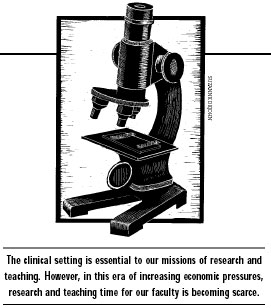From the Dean
Clinicians as academics
By John C. Baldwin, M.D.
Like all medical schools, Dartmouth has two broad categories of departments— basic science and clinical. At DMS, there are seven basic science departments and nine clinical departments, including the Norris Cotton Cancer Center. In this new era of understanding more about the mechanisms of wellness and disease through scientific inquiry on many fronts, the distinctions between these two categories of departments are being blurred. This is good—good for our patients, good for society, and also good for our faculty. Our new Department of Genetics captures the quintessence of this era, with its promise of translating basic science discoveries into clinically meaningful advances.

Vitality: For those of us, like me, who are members of clinical departments, this era brings renewed vitality to our commitment to discovering knowledge and to teaching. We must remember that it is these distinctive aspects of the careers of clinical faculty— research and teaching—that are crucial to progress in science and medicine and to the preparation of truly excellent practicing doctors for the future. Moreover, we cannot accomplish these two responsibilities without direct involvement by clinical faculty in the provision of high-quality, low-cost care for our patients. It must be recognized, however, that this combined set of responsibilities places unusually heavy demands on faculty members in the clinical departments.
The challenges that we, as faculty, face in academic medical centers require thoughtful attention and immediate action. We must protect the environment that allows clinical faculty to teach the doctors of the future as well as to conduct the research that is the basis for progress in maintaining wellness and treating disease. Yet, in an era of declining reimbursements for clinical care from both governmental and private sources, the nation's 125 academic medical centers— including DHMC—are treated exactly the same way the other roughly 6,000 hospitals in the country are treated. We must articulate our mission more clearly to the public; we must find new ways of partnering with industry; we must explore opportunities in technology transfer that may help to support research and teaching; and we must, increasingly, rely on the philanthropic support of those friends who recognize the vital nature of our clinical faculty's work.
Umbrella: We must also work continually within our system to nurture clinician scientists. Under the umbrella of Dartmouth-Hitchcock Medical Center, all of the physicians, many allied health professionals at Mary Hitchcock Memorial Hospital, and many providers in the community are members of the full-time faculty of Dartmouth Medical School. This faculty numbers nearly 900 and is the largest faculty at Dartmouth College, by a considerable margin.
As Dartmouth faculty members and as physicians, we in DMS's clinical departments are privileged to have the opportunity to provide care for the patients of our region and beyond. In addition to the gratification that this opportunity provides to us as physicians, the clinical setting is essential to our missions of research and teaching. Questions that arise in the clinical setting generate questions for research. Results of that research are transferred, after careful, informed evaluation and discussion with patients, to benefit patients both here and elsewhere. However, in this era of increasing economic pressures, and related time pressures, research and teaching time for our faculty is becoming more and more scarce.
DMS must pursue new ways to allow faculty in clinical departments to conduct research and to teach in this era of increasing fi- nancial pressures and demands for clinical "productivity." For medicine to be different and better 20 years from now, and for our nation and the world to have well-informed, excellent physicians in the future, we cannot fail. We must therefore support the full range of ambitions and abilities of our faculty in the clinical departments.
Partnership: To that end, I have recently created the new position of senior associate dean for clinical faculty. This senior Medical School administrator will be responsible for promoting the clinical, educational, and research interests of DMS faculty in the clinical departments and will work to enhance the strong partnership between DMS faculty and the excellent clinical delivery system that is at the heart of Dartmouth-Hitchcock Medical Center.
I am delighted to report that Professor David Roberts has accepted this important position. Dr. Roberts, a professor of surgery and chief of neurosurgery, is a distinguished neurosurgeon and a world-renowned scientist. His work, principally in the area of epilepsy, has been carried out in collaboration with many other clinician-scientists at DMS as well as with members of the Dartmouth psychology and engineering faculty and has been of seminal importance in improving techniques in complex brain surgery. He will continue as chief of neurosurgery and will also now have broad responsibility for facilitating the academic and clinical aspirations of clinical faculty, in this era of great change in health-care delivery and economics—but of unchanging need for preeminence in research and teaching.
Illustration by Suzanne DeJohn
John Baldwin is vice president for health affairs of Dartmouth College and dean of DMS.
Back to Fall 2000 Dartmouth Medicine
